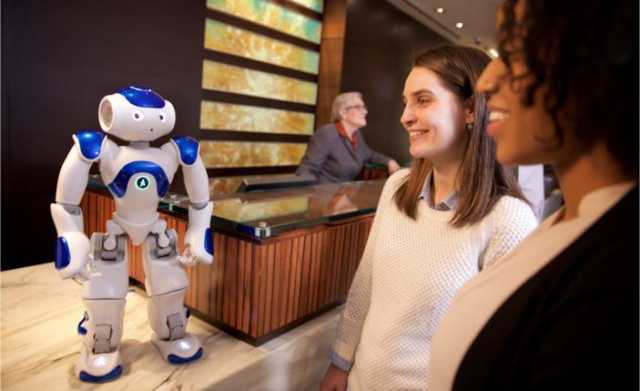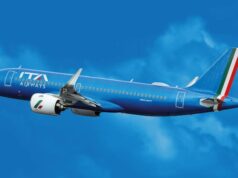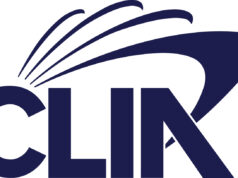ITB Berlin Convention turns the spotlight on one of the year’s most fascinating technological subjects – Live demonstration of service robot “Pepper” – Discussions about the opportunities offered by chatbots and virtual assistants and their impact on the international travel industry
Artificial intelligence in all its facets: several of the sessions at this year’s ITB Berlin Convention will be devoted to “Artificial Intelligence“ and its use in the travel industry. Chatbots, virtual assistants and humanoid robots are already making the customer’s life easier in all kinds of areas from travel bookings to hotel check-ins, but they also present the industry with new challenges. At this major think tank for the international travel industry experts with a wealth of practical experience will be passing on their knowledge from 8 to 11 March 2017 and will be giving visitors valuable and entertaining insights into the world of artificial intelligence.
In his keynote speech at the ITB Future Day on 8 March on the subject of “Technology vs. Humanity? Artificial intelligence and the prospects it offers for business, society and humankind“, Prof. Dr. Hans Uszkoreit, Scientific Director and Head of the Faculty of Language Technology at the German Research Centre for Artificial Intelligence (DFKI), will explain the extent to which artificial intelligence will change business structures, social processes and our private lives. The current capabilities of robots will be demonstrated live on the stage on the same day by the robot Pepper during the ITB Destination Day 1. Nicolas Boudot, EMEA Sales Director, SoftBank Robotics Europe, will report in more detail about the many promising applications for service robots at destinations, and areas where they can be particularly effectively deployed.
Artificial intelligence is also pointing the way in the hotel sector. At the ITB Hospitality Day on 9 March the chairman, Dr. Andriew Lim, Professor of Technopreneurship and Innovation in Hospitality, Hotelschool The Hague, will pose the question: “Is the hotel sector welcoming digitalisation, with all its innovations in automation, the internet of things and artificial intelligence?“. The question is: what ideas and interfaces will provide hotels with new kinds of freedom and satisfaction. Taking part in the discussion will be Sarah Kennedy Ellis, Vice President Global Marketing & Portfolio Strategy Sabre, Andreas Pröfrock, Director Strategic Alliances and Technology Partnerships WW Alcatel-Lucent Enterprise International, Frippe Stenberg, Vice President Brand and Guest Journey Scandic Hotels, and Rohan Thakkar, Vice President Development & Strategy YOTEL.
Participants in the session entitled “The Next Big Thing: artificial intelligence – disruption to travel decisions and bookings?” at the ITB Marketing and Distribution Day on 10 March will learn how artificial intelligence can be effectively applied in tourism. Technology giants are making massive investments in research into artificial intelligence and its applications. A presentation by Norm Rose, President, Senior Technology and Corporate Market Analyst, Travel Tech Consulting Phocuswright Inc., will explain the status quo. In a subsequent interview with Philip C. Wolf, founder of PhocusWright and Serial Board Director, they will investigate future directions. This will be followed by a panel discussion during which the two of them will be talking to Thomas Houriez, Co-Founder & Vice President Marketing Sépage S.A.S, David Low, Developer Advocate Skyscanner, and David O’Flanagan, CEO Boxever, about previous experience with chatbots and big data analyses.
In his kick-off paper on “Artificial intelligence and virtual reality: Megatrends in a dynamic technological environment“ and a subsequent discussion with Brekke Fletcher, Travel Executive Editor CNN, Mark McSpadden, Director of Technology Sabre Labs, will show how man-machine interfaces and digital reality will alter travel in the future. Technological research institutes like Sabre Labs are investigating innovative technological trends and their impact on travel behaviour in the next decade.
Digital IPAs (intelligent personal assistants) are now an increasingly common feature in dealings with guests. On the eTravel Stage on 8 March the paper by Stefan Niemeyer, Senior Conversion Architect neusta etourism GmbH, will explain how learning robots, Amazon Echo or Google Home are altering the travel experience, and the changes to which tourism marketing will have to adapt. On the same day a special event will tell visitors all they need to know about “Chatbots, artificial intelligence and machine learning in interaction with customers“. In a discussion chaired by Timothy J O’Neil-Dunne, Co-Founder Expedia, Tnooz, T2impact, Airblackbox; Managing Partner VaultPAD Ventures: Global, the massive potential offered by digital assistants will be investigated by Matthias Keller, Chief Scientist Kayak, David Low, Developer Advocate Skyscanner, and Mike Slone, Chief Experience Officer Travelaer SAS.
Also on the Wednesday at ITB, at the eTravel Lab Day, Tymon Wiedemair, co-founder and Chief Executive of Ulmon GmbH, will explain how artificial intelligence can be used to personalise travel content on mobile devices. This has been made possible by the introduction on a mass scale of “mobile“ technologies in recent years, as well as by the creation of powerful artificial intelligence systems that make use of localised data in order to supply travellers with personalised content.
The paper at the ITB Young Professionals Day on 8 March will illustrate how digitalisation in the tourism sector has also altered the requirements imposed on newcomers to the industry. Prof. Armin Brysch, International Relations Coordinator, Faculty of Tourism, Hochschule Kempten, Head of the Vocational Training Committee of the DRV, and Michael Faber, consultant and Chief Executive Tourism, Tourismuszukunft, will explain the sort of technological skills that today’s graduates must have, and will use actual examples such as VR glasses and artificial intelligence to show what technology in tourism can now offer.












